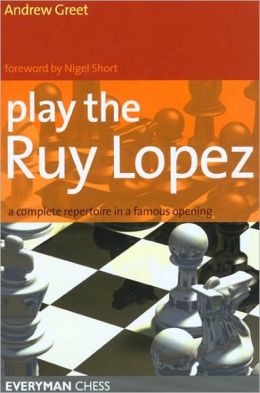Play The Ruy Lopez
Andrew Greet

At the beginning of my chess career, I first embraced the romantic Vienna Game (1.e4 e5 2.Nc3 Nf6 3.f4). However, over time I realized that the true joy of playing 1.e4 came from the evergreen Ruy Lopez (1.e4 e5 2.Nf3 Nc6 3.Bb5). Here we see stirring attacks against the enemy King, brilliant incursions into blacks queenside (usually down the a-file), and subtle positional struggles (often featuring a spatial plus and/or the battle for the squares d5 and f5). It has everything! I also learned to love the Ruy Lopez because Black can use many interesting systems, every one offering vastly different plans, structures, and ideas. It almost goes without saying that I would have never left 1.e4 for 1.d4 if I had been promised a Lopez each and every time.
Today, the Ruy Lopez is as rich as ever, offering fertile areas of investigation and endless vistas of creativity for both sides (my review of the excellent The Ruy Lopez: A Guide For Black by Sverre Johnsen and Leif Johannessen discusses some black ideas vs. the Ruy). In fact, its not unusual to see a player like Anand use it as White in one game and then face it as Black in the very next round.
Of course, such an important opening has seen many articles and books devoted to its secrets appear over the years. The newest in this line of Lopez studies is Play The Ruy Lopez by English IM Andrew Greet. However, this book isnt a complete treatise of the Ruy; such a project could easily fill two thousand pages! Instead, Mr. Greet offers us a white repertoire vs. 1.e4 e5 2.Nf3 Nc6 thats up to date and eminently practical.
The cornerstone of Mr. Greets recommended handling of the Ruy Lopez is the Worrall Attack: 1.e4 e5 2.Nf3 Nc6 3.Bb5 a6 4.Ba4 Nf6 5.Qe2. This system avoids theoretical landmines like the Marshall Attack and the Open Defense. If allowed, White will effectively follow up (after 5…b5 6.Bb3 Be7) with 7.0-0, 8.c3, 9.Rd1 with d4 to follow.
One might wonder if this line can be effective, since it seems that everyone would play the Worrall Attack if they could cut down Blacks options AND still be guaranteed an edge. However, it is indeed a serious weapon (it has bite and is easy to learn) and grandmaster Tiviakov has won one game after another with it in recent years.
Play The Ruy Lopez isnt only about the Worrall, of course. It gives complete answers to every other black system. For example, nowadays the Berlin Defense (1.e4 e5 2.Nf3 Nc6 3.Bb5 Nf6 4.0-0 Nxe4 5.d4 Nd6 6.Bxc6 dxc6 7.dxe5 Nf5 8.Qxd8+ Kxd8), which was Kramniks main weapon in his successful match versus Kasparov, has become quite a pain in Whites ass. Greets book doesnt want you to touch this thing, and instead simply recommends 4.Qe2 (avoiding …Nxe4) when we end up back in Worrall-like positions.
Other lines (great and small) that are thoroughly explored from Whites perspective are: insane lines (3…g5, 3…d5, 3…f6, 3…a5, 3…Bd6, 3…Be7, 3…Qe7, 3…Qf6, 3…Bb4), oddities on the fourth move after 3…a6 4.Ba4 (4…Qf6, 4…Nd4, 4…Bd6, 4…Be7, and 4…Bb4), 4…g6, 4…Nge7 (the Cozio), 4…Bc5, 4…f5 (the Schilemann), 4…b5 5.Bb3 Na5 (the Norwegian Variation), and 4…d6 (the Steinitz Deferred).
If you are rated 1400 to 2200 and if you are a fan of the Ruy Lopez (from Whites perspective), Play The Ruy Lopez.
